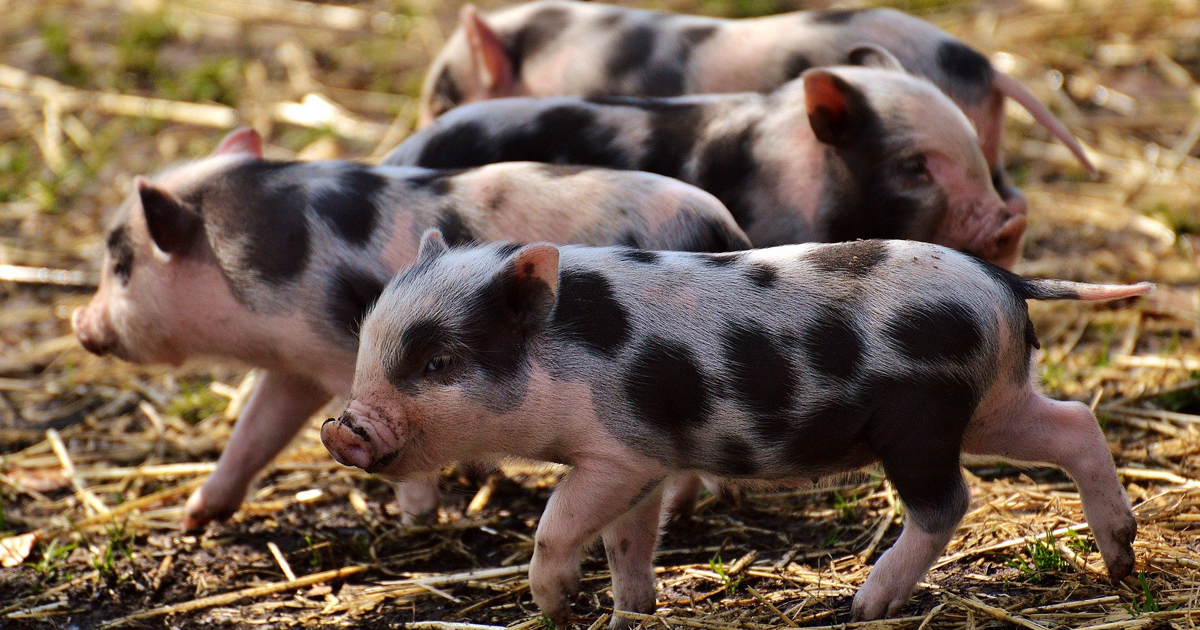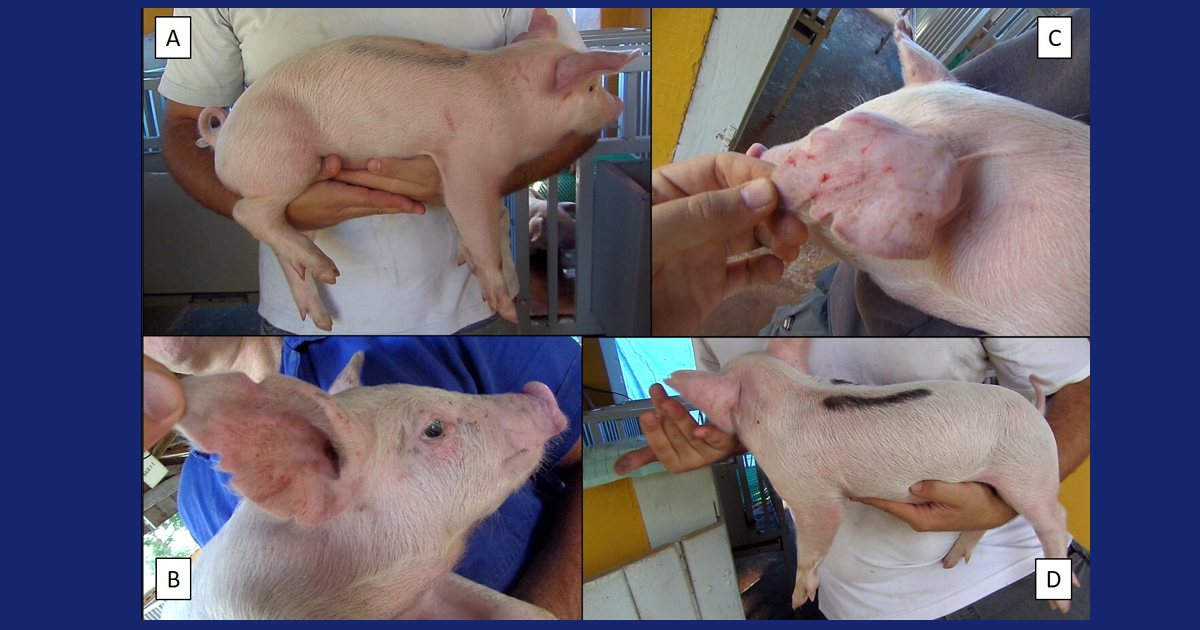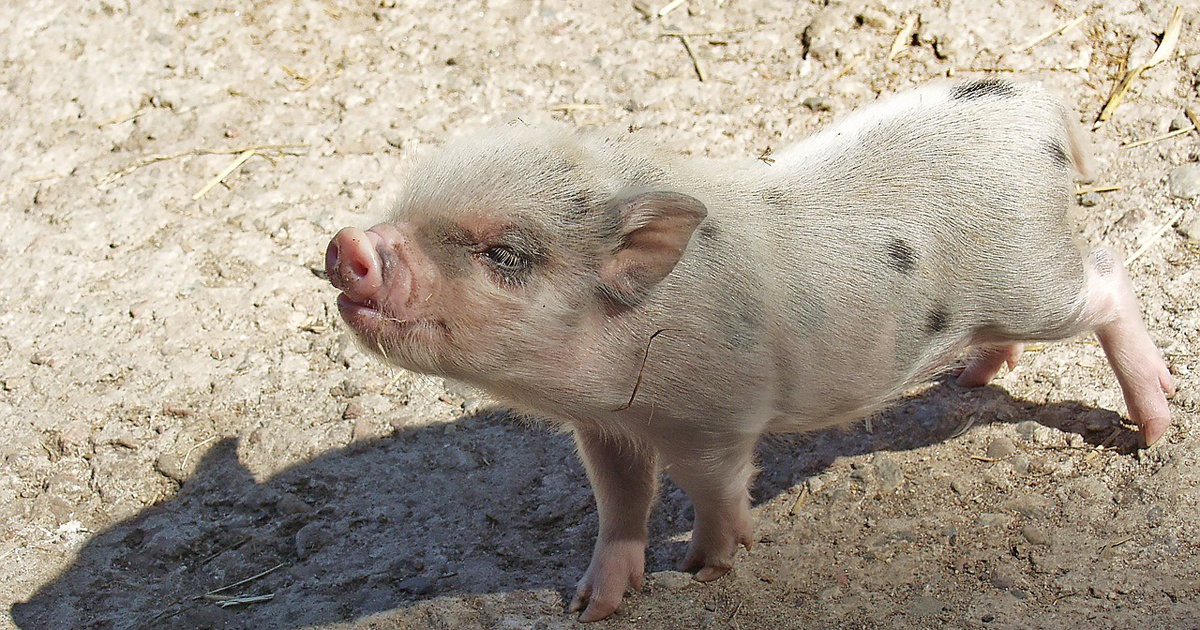Gestational pain can affect the life of the offspring due to the overproduction of hormones in response to inflammation

By: Julio Bernardes
Art: Simone Gomes
Piglets born from swine females, that suffered from pain during gestation caused by difficulty in walking (claudication), have shown to be more aggressive, according to research conducted at the School of Veterinary Medicine and Animal Science (FMVZ) at USP. The study found that piglets, after weaning, had a greater number of skin lesions caused by aggression in the group, in addition to reduced weight, when compared to piglets farrowed by sows without claudication. According to these researchers, the results show that female suffering from pain during pregnancy can affect the life course of her offspring,
due to the overproduction of hormones in response to inflammation The research is described in an article published in the journal Scientific Reports on June 22.
“The level of hormones produced by animals under stress can modify the central nervous system, as previous work by our research group has shown”, says FMVZ professor Adroaldo Zanella, research coordinator, and researcher Marisol Parada Sarmiento, who participated in the study. Animals in high welfare situations can mitigate the negative effect of stress on offspring. However, when adaptive systems suffer exaggerated demands from chronic pain, represented by claudication, these systems are not sufficient to protect the fetuses, who end up impaired by this stress.”

Claudication affects female pigs in different aspects, mainly through the pain component, defined by the International Association for the Study of Pain (Iasp) as an unpleasant emotional and sensory experience associated with actual or potential tissue damage. Thus, changes in the claudication of swine females endanger all areas of animal welfare. The pain makes the animal unable to access and compete for resources, its social behavior is altered, and it takes less care of its offspring, the researchers point out.
“A clawing female then finds herself at risk of starvation, thirst, social stress, and suffering due to the pain condition she is in”.
In the research, which involved 22 pregnant females and their offspring, the animals were characterized using a visual assessment of locomotion, which shows the seriousness of the pain process. “The females which were studied and characterized by a severe claudication score had pain indicators,” report the researcher and the FMVZ professor. “In animals, including humans, altering the walking process

may be an attempt to reduce pain, i.e., by distributing weight other limbs, bending the spine, or even, in extreme situations, avoiding resting the limb on the ground.”
The evaluation carried out by the researchers showed that piglets born to porcine sows that suffered during pregnancy were more aggressive. “Two researchers, unaware of the experiment, counted lesions on the piglets' skin after weaning, which occurred at 28 days”. they point out. “We found that weaning weight was reduced and measures indicating fear were different in piglets born to sows with pain”.
Aggressive behavior

Marisol and Zanella describe pigs as social animals and use a complex repertoire of behaviors to define their social position within the group. “Aggressive behavior is one of the last resources they use, due to the occurrence of injuries and uncertainty of the outcome of fights.” they point out. “When we computed the data from two independent raters, who counted injuries from photos, we found that animals born to females that showed pain engaged in a greater number of fights”.
“In response to pain situations the body responds with the release of stress hormones, such as cortisol, and also inflammatory cytokines, which play an important role for homeostasis, that is, the body’s balance,” Marisol and Professor Zanella point out. “However, when the concentrations exceed the body’s ability to adjust to such substances, they can damage systems in the brain, compromising neurons, as our group has already demonstrated in pigs and sheep”.
According to these researchers, the role of exaggerated and uncontrolled inflammatory reactions is highlighted, for example, in
aggravating cases of COVID-19 in humans. “In the first instance, the pain is quite a problem for the gestating female since it affects her ability to adapt to the social environment, compete for resources, among so many other implications”, they point out. “For offspring, exposure to the uterine environment of an animal with both stress and pain responses, including inflammatory markers, has changed the behavior of piglets. The animals turned out to be more aggressive.”

For pigs and people, social interaction is very important, according to the researchers. “We argue that offspring behavior changes when mothers experience pain during gestation. The impact of conditions that increase aggressive interactions can reduce productivity in pigs and increase injury and disease”, they say. “If the effects are comparable in humans, we understand that social relationships may be affected, however, this comparison is very difficult given the complex network of interactions that humans experience during their lifetime.”
The research was conducted at the Center for Comparative Studies in Health, Sustainability, and Welfare, which is part of the Department of Preventive Veterinary Medicine and Animal Health at FMVZ, coordinated by Professor Zanella. The claudication data were collected by FMVZ doctoral student Thiago Bernardino de Almeida and evaluated by Marisol, also a doctoral student, who is continuing her studies on the subject at the University of Teramo (Italy). The emotionality tests of the offspring were performed by FMVZ doctoral student Patricia Tatemoto, and the statistical analysis of the data collected had the support of Gina Polo, who works in the Epidemiology and Public Health Research Group at Universidad de la Salle, in Colombia. The study was supported by the São Paulo State Research Support Foundation (Fapesp), the swine genetics company TOPGen, and Certified Humane, a certifier in the area of animal welfare.
Further information: e-mails adroaldo.zanella@usp.br, with professor Adroaldo Zanella, and mparadasarmiento@unite.it, with Marisol Sarmiento